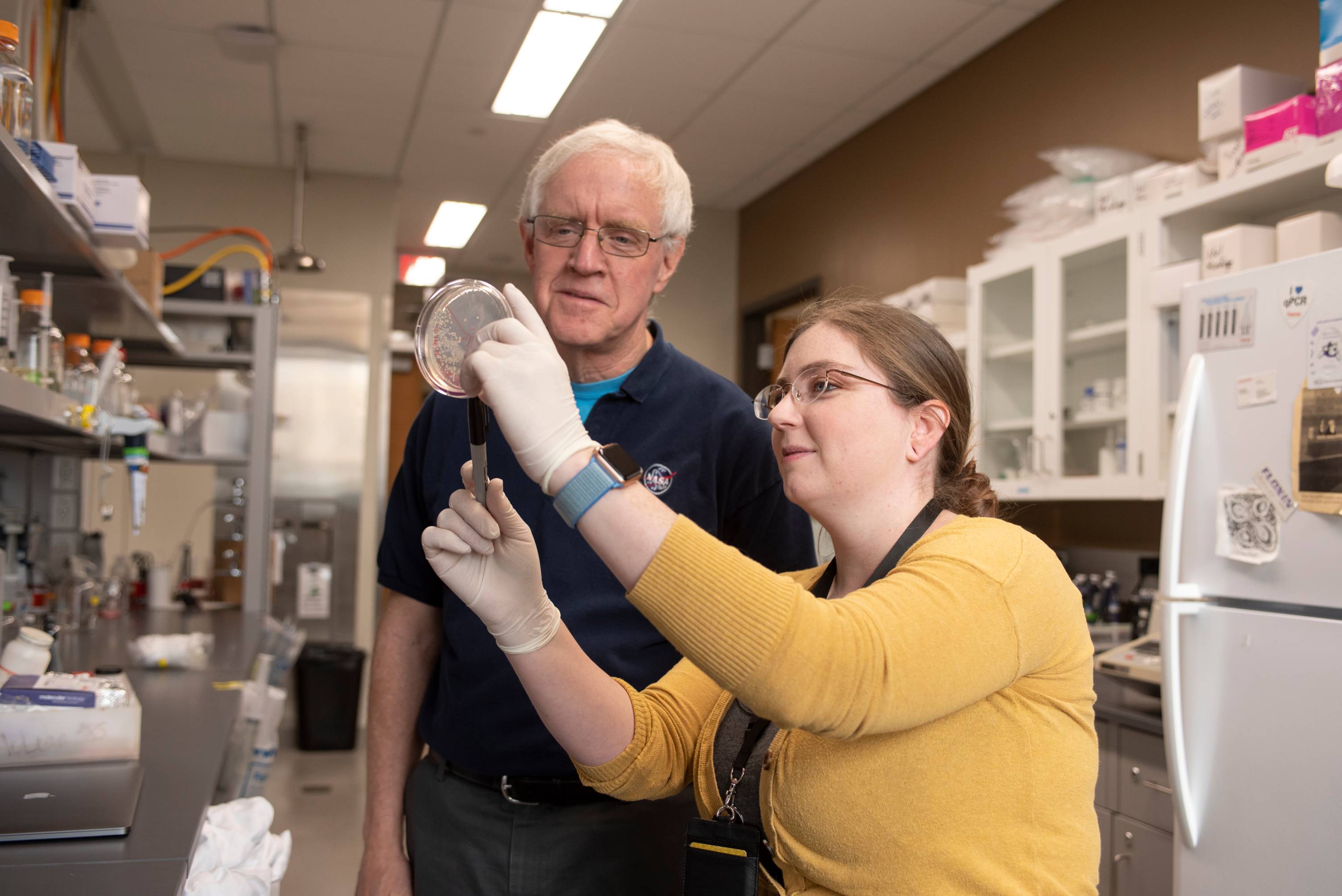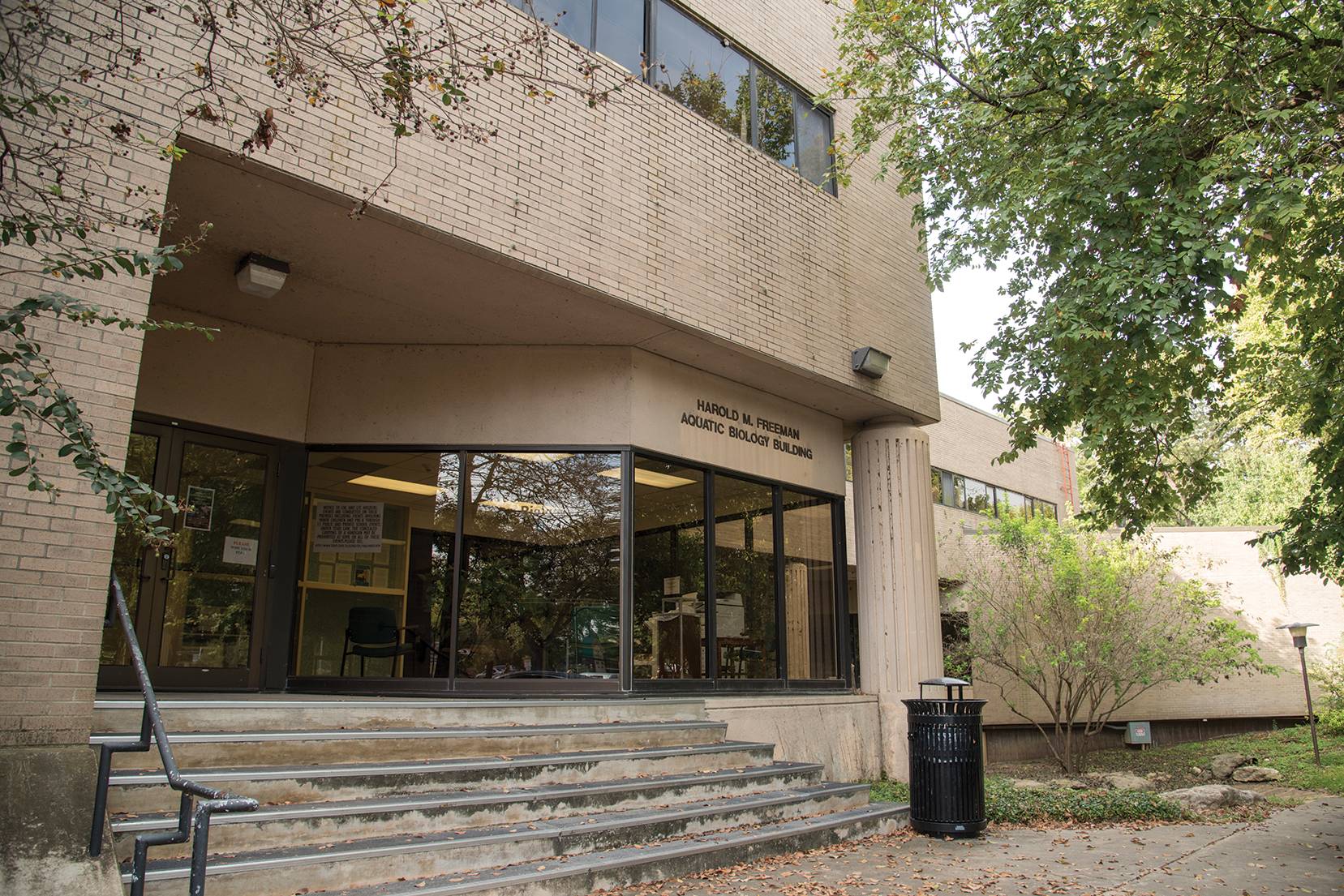Aquatic Resources and Integrative Biology (Ph.D.)
Ph.D. Aquatic Resources and Integrative Biology

Program Overview
Texas State's location, near many terrestrial and aquatic ecosystems, including San Marcos Springs, the headwaters of the San Marcos River, as well as The Meadows Center for Water and the Environment, Aquarena Center and the Freeman Center, provides students with a unique opportunity for study and research.
Course Work
Students entering the doctoral program with an earned master's degree in an appropriate field must complete 61 hours of graduate course work, which includes 21 hours of core courses and 40 combined hours between elective courses and dissertation research (with a minimum of 15 dissertation hours).
Each doctoral student has a research and study program designed to meet the student's academic goals, including core skills the student wants to develop. The program also includes a mix of elective courses to provide the scientific expertise and knowledge required to work on complex problems focused on integrative biology and the sustainable use of ecosystems and natural resources.
| Degree | Course Work | Dissertation | Total Hours |
|---|---|---|---|
Degree Ph.D. | Course Work 46 hours | Dissertation 15 hours minimum | Total Hours 61 hours |
Degree Ph.D. | Course Work 76 hours (for applicants with bachelor's degree only) | Dissertation 15 hours minimum | Total Hours 91 hours |
Program Details
Texas State’s local resources give students the ability to study habitats for threatened or endangered species and to develop and promote programs for the sustainable use of aquatic resources and ecosystems.
Program Mission
The doctoral program emphasizes original research (including basic and applied) to provide depth and breadth of knowledge in aquatic resources and integrative biology and related disciplines, from the watershed and ecosystem scale down to the population, organismal and microbial scale. Students are engaged in a collaborative research environment among students, faculty, natural resource agencies, nonprofit organizations and public and private interests. The curriculum stresses active roles for students in intellectual exchange with faculty and peers and in the critique of published research. The program prepares students to identify and solve complex problems relevant to the sustainable use of terrestrial and aquatic resources and ecosystems.
Career Options
The program facilitates the entry of its students into the professional community of scholars and natural resource practitioners in a manner emphasizing the completion, presentation and publication of original, creative research. Among graduating doctoral students, approximately 45% go to academia, 20% to federal/state agencies, 15% to the public sector, and 20% to the private sector.
Program Faculty
The program's full-time faculty members have established outstanding research programs in molecular/cellular biology, wildlife ecology, population biology, ecology, aquatic resources and science education. Faculty have published in top-tier journals and been supported by the National Science Foundation, National Institutes of Health, National Aeronautics and Space Administration, and various federal and state natural resource management agencies. Through education, scholarship and outreach activities, the department enhances the Texas State image by using the life sciences to help meet current and future needs of society.
Contact The Graduate College for general questions about getting started with your application, funding your degree, and more. If you have program-specific questions after reviewing the program details, we encourage you to contact the following individuals.
Graduate Advisor
Jason Martina
j_m1601@txstate.edu
512 245 0565
Supple Science (SUPP), Room 320

Apply Now Already know that Texas State is right for you?
Application Deadlines
| Deadlines | U.S. Citizen | International |
|---|---|---|
Deadlines Fall | U.S. Citizen January 15 | International January 15 |
Deadlines Spring | U.S. Citizen August 15 | International August 15 |
This program's deadline is firm. This type of deadline means the application and other application requirements must be submitted by the program's specified deadline day.
The spring 2024 application deadline has been extended to September 15, 2024 for all applicants.
|
|
Funding Information For scholarship, fellowship or assistantship consideration, applications must be completed by the deadline above. |
|
|
Decision Timeline This program reviews applications on a firm basis. |
Admission Requirements
The items required for admission consideration are listed below. Additional information for applicants with international credentials can be found on our international web pages.
-
Application
- Completed online application
Review important information about the online application.
-
Application Fee
- $55 Nonrefundable application fee, OR
- $90 Nonrefundable application fee for applications with international credentials
Review important information about application fees.
-
Transcripts & GPA
Applicants with a bachelor's and a master's degree:
- baccalaureate degree from a regionally accredited university (Non-U.S. degrees must be equivalent to a four-year U.S. Bachelor’s degree. In most cases, three-year degrees are not considered. Visit our International FAQs for more information.)
- master's degree in biology, chemistry, engineering, geology, or a related natural science field from a regionally accredited university (Non-U.S. degrees must be equivalent to a U.S. Master’s degree. Master’s degrees following a three-year Bachelor’s degrees may not be equivalent; please contact gradcollege@txstate.edu if you are unsure.)
- a copy of an official transcript from each institution where course credit was granted
- minimum 3.25 GPA in all completed graduate course work
Applicants with a bachelor's degree only:
- baccalaureate degree in biology, chemistry, engineering, geology, or a related natural science field from a regionally accredited university. Applicants with backgrounds in other disciplines will be considered on a case-by-case basis.
- official transcripts required from each institution where course credit was granted
- minimum 3.5 GPA in your last 60 hours of undergraduate course work (plus any completed graduate courses) (Effective Fall 2024: a 3.5 overall GPA or a 3.5 GPA in your last 60 hours of undergraduate course work, plus any completed graduate courses)
Review important information about transcripts. Official transcripts, sent directly from your institution, will be required if admission is granted.
-
Test Scores
GRE
- GRE not required
Approved English Proficiency Exam Scores
Applicants are required to submit an approved English proficiency exam score that meets the minimum program requirements below unless they have earned a bachelor’s degree or higher from a regionally accredited U.S. institution or the equivalent from a country on our exempt countries list.
- official TOEFL iBT scores required with a 78 overall
- official PTE scores required with a 52 overall
- official IELTS (academic) scores required with a 6.5 overall and
- minimum individual module scores of 6.0
- official Duolingo scores required with a 110 overall
- official TOEFL Essentials scores required with an 8.5 overall
This program does not offer admission if the scores above are not met.
Review important information about official test scores. -
Documents
- mentor recommendation letter from a current Texas State doctoral faculty member in the Aquatic Resources and Integrative Biology program. Visit the faculty list for current faculty and their research interests and contact information. Your mentor must email their letter of support directly to The Graduate College at gradcollege@txstate.edu. This letter must be on file before the program's deadline.
- Since admission to this thesis-/dissertation-based program requires an intent to mentor letter (an agreement from one of our faculty members to supervise your research project) as part of the application process, we strongly recommend that applicants contact potential mentors by sending their CV and research interests and securing that agreement prior to submitting an admission application. The department cannot guarantee that a suitable mentor will always be available.
- resume/CV summarizing your educational and professional accomplishments
- statement of purpose describing your professional aspirations and rationale for pursuing a doctoral degree in aquatic resources
- three letters of recommendation addressing the substance and quality of your preparation for doctoral study
Review important information about documents.
- mentor recommendation letter from a current Texas State doctoral faculty member in the Aquatic Resources and Integrative Biology program. Visit the faculty list for current faculty and their research interests and contact information. Your mentor must email their letter of support directly to The Graduate College at gradcollege@txstate.edu. This letter must be on file before the program's deadline.